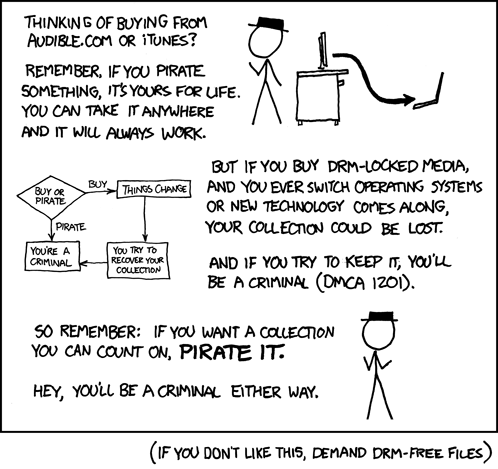 People like to play with the things they like. If we play with snippets of music, we are called pirates by the music industry. If we play with other cultural items, like TV and comic book characters, and if we do it in spaces like Spore or LittleBigPlanet, it's seen as acceptable (although I am sure it is a bit more complex than that, I don't have any insider info from EA or Sony about it).
People like to play with the things they like. If we play with snippets of music, we are called pirates by the music industry. If we play with other cultural items, like TV and comic book characters, and if we do it in spaces like Spore or LittleBigPlanet, it's seen as acceptable (although I am sure it is a bit more complex than that, I don't have any insider info from EA or Sony about it).
What is interesting is when branches of the big intellectual property companies, like Sony (with Sony Music, and Sony's movie and television production), have spaces where intellectual property is borrowed by the company itself (although since companies are not people, obviously this is done by the people at the company). So Sony's EverQuest II has lots of cultural homages (or theft) in it, placed there by the people who work for Sony Online Entertainment. One "homage" is the epic (or something) questline for the swashbuckler character class, which is loosely but obviously based on the movie The Princess Bride. Swashies are pirates, right? And pirates are an important part of the film.
(Hmm actually I should, to be thorough, see if that's a Sony film -- but there are lots of examples in EQII that aren't owned by Sony, so even if this is not a good example the point still holds.)
And this is found across companies and virtual spaces, so I was pleased but not too surprised upon some reflection to discover another
Princess Bride reference in Bethesda's recent game
Fallout: New Vegas (developed by Obsidian). In one cave you will discover big cave rats, but, they are not just big rats in a cave, they are
rodents of unusual size. If you know
The Princess Bride, you know
there are rodents of unusual size in the fire swamps. It is possible this is done with permission, but I really doubt it. (That would also put a big dent in this argument.)
But, the whole point of this post is that I took a photo of it (since I play it on my Xbox 360, not on a PC where I could take screen shots and have mods, which would be cool).
(The "S" down at the bottom of the photo is light hitting the S in Sharp, the brand of television I have currently.)



